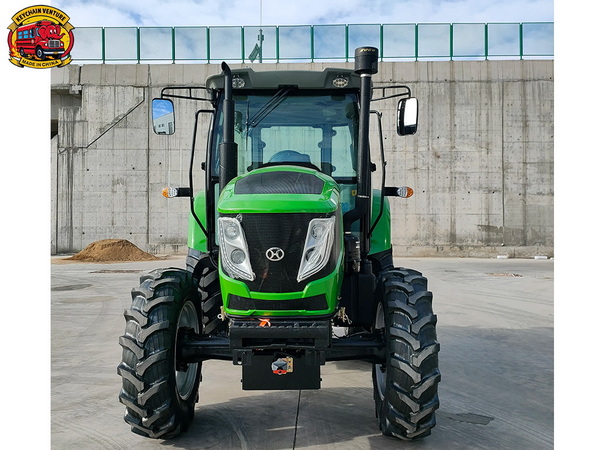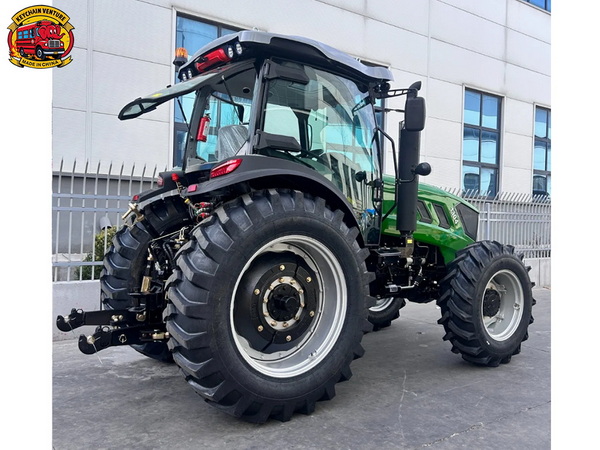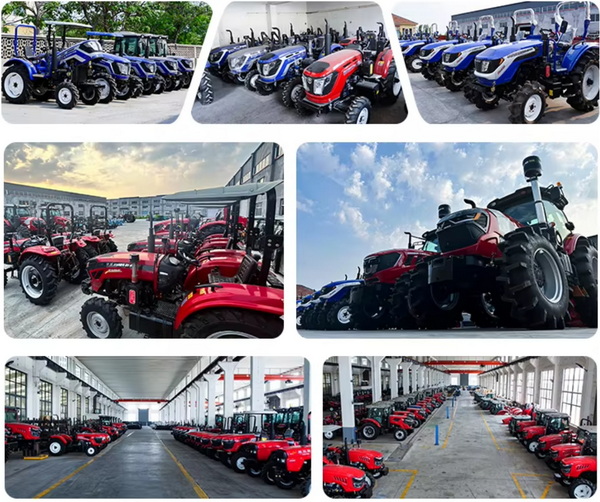Views: 222 Author: Amanda Publish Time: 2025-10-25 Origin: Site








Content Menu
● The Used Tractor Market: An Overview
● What Drives Used Tractor Prices?
>> Accessories and Attachments
>> Location and Transferability
● Digital Solutions for Price Estimation
● Step-by-Step Estimation Guide
>> 1. Clarify Operational Requirements
>> 3. Conduct Rigorous Inspections
>> 4. Confirm Service Record Integrity
● Inspections: The Buyer's Checklist
● The Role of Virtual Inspections
● Avoiding Hidden Pitfalls in Used Tractor Purchases
● International Buying Insights
● Practical Example: Used Tractor Purchase Workflow
● FAQ
>> 1. What steps should be taken before buying a used tractor?
>> 2. How does tractor age affect its price?
>> 3. Why is reviewing maintenance history important?
>> 4. Is remote video inspection reliable?
>> 5. What are the risks of international tractor purchases?
Estimating the cost of a used tractor requires a keen understanding of market trends, technical factors, inspection routines, and negotiation strategies. With the global expansion of suppliers such as KeyChain Venture Co., Ltd. and rising demand for commercial vehicles, buyers are eager to unlock the best deals without sacrificing reliability or performance. This comprehensive guide equips buyers with the practical knowledge needed for confidently evaluating used tractor costs in domestic and international markets.

The used tractor market operates on a mosaic of variables, including brand reputation, seasonal demand, and technological innovation. In China, major suppliers enable buyers to access a broad range of pre-owned machinery suited for various tasks. Prices shift in response to aggregate global freight costs, local agricultural cycles, and fluctuating raw material prices. For instance, a significant upswing in steel prices or the introduction of new emission standards will often push up the cost of newer models while stabilizing prices for second-hand equipment.
Choosing the right model year is pivotal for both cost savings and operational efficiency. Tractors from recent years tend to feature low engine hours, updated emissions systems, and advanced control features. Older tractors, while more affordable, may require additional investments in maintenance and upgrades.
Engine hours, akin to the mileage of a car, measure the total time a tractor has been operated. Low-hour tractors typically command higher prices, whereas heavily used options undergo depreciation at a faster rate. Physical condition directly affects pricing, with sellers of well-maintained machines often providing comprehensive maintenance logs, which serve as a guarantee of residual value and operational integrity.
Tractors are routinely sold with attachments, such as front loaders, harvesters, or plows. These additions amplify functionality—and cost. Evaluate the utility of each attachment against operational needs rather than just total value, ensuring compatibility with your planned use.
Prices in tractor-rich regions tend to be more competitive, but international buyers must weigh the impact of shipping costs, insurance premiums, and destination-specific duties. Procurement from distant suppliers should factor in logistics complexity and the availability of local support and spare parts.
A transparent maintenance history imbues confidence in buyers and allows for better cost predictions. Sellers who furnish detailed service records often justify premium pricing by demonstrating diligence and minimizing the risk of unexpected repairs.
Online platforms like KeyChain Venture are revolutionizing the used tractor buying process. Buyers can compare listings, track price changes, and view inspection videos that reveal the current condition of each tractor. The ability to schedule real-time virtual inspections greatly reduces geographic barriers, empowering buyers with direct information about wear, modifications, and upgrades.
The following framework ensures buyers approach cost estimation systematically while mitigating risk:
Begin by determining your primary use scenarios, from routine farming to hauling and landscape construction. List the necessary machine specifications and preferred features to guide research and screening.
Evaluate prices across reputable dealer websites, B2B exchanges, and industry platforms, focusing on tractors closely matching your requirements. Analyze listing trends to avoid overpaying for underperforming models.
Schedule either in-person or virtual inspections. Scrutinize critical systems—engine performance, transmission condition, hydraulic integrity, rust levels, tire wear, and any visible repair work. Trustworthy sellers should offer inspection videos and walk-throughs of major tractor components.
Review all maintenance receipts, service logs, and parts replacement histories. Rigorous documentation signals reliability, reduces the risk of breakdowns, and increases resale value.
Utilize depreciation calculators or online guides to gauge expected value loss over time. Cross-reference with industry benchmarks for the specific tractor make, model, and year.
Assess all accompanying accessories or attachments, considering their replacement costs, compatibility, and expected lifespan. Factor these into your total purchase estimate only if they add genuine operational value.
For cross-border trade, total transport, insurance, and customs duties. Request detailed logistics quotes before finalizing purchase decisions.
Present your research, inspection findings, and cost calculations during negotiations. Proactively address condition discrepancies or missing documentation while remaining firm about budget constraints.

Performing a thorough inspection is the cornerstone of accurate cost assessment. Use this checklist to minimize risk:
- Examine the engine and transmission for leaks, odd noises, and excessive vibration.
- Test the hydraulic systems with all attachments engaged.
- Review tire condition and measure tread depth.
- Assess sheet metal and rust, especially under the chassis and wheel arches.
- Verify that control systems, lights, and safety features function correctly.
- Inspect service logs for irregularities or skipped maintenance tasks.
Modern platforms allow buyers worldwide to access detailed videos showing tractors in operation. These inspections reveal true running conditions, highlight any mechanical faults, and let buyers review cosmetic details that static pictures might miss. This transparency enhances decision-making and supports more accurate negotiations.
Many buyers underestimate the impact of hidden faults and unexpected expenses. Be alert to these common pitfalls:
- Buying units with undocumented maintenance
- Ignoring repair history and aftermarket modifications
- Miscalculating transfer costs, insurance premiums, and compliance upgrades
- Trusting listings without physical or virtual inspection evidence
- Overlooking the need for replacement parts in your target market
Effective negotiation rests on thorough preparation. Leverage independent market research, technical inspection notes, and alternative offers to strengthen your position. Be transparent about concerns, and don't hesitate to request further evidence or conditional warranties from sellers.
Purchasing a used tractor internationally, especially from China, involves unique challenges and advantages:
- Engage with suppliers offering end-to-end logistics support and export experience.
- Insist on proper export/import documents and local regulatory compliance checks.
- Validate spare part supply chains for long-term operation and maintenance needs.
- Utilize escrow or third-party payment platforms for increased transactional security.
Securing the optimal used tractor isn't just about the initial purchase price—it's about maximizing operational lifespan and return on investment. Buyers can boost long-term value by prioritizing well-maintained units, investing in training for proper usage, and scheduling consistent preventive maintenance. Tractors with robust support networks, access to spare parts, and upgradable features tend to deliver greater cost efficiency throughout their service lives.
Consider a buyer in Brazil sourcing a high-performance used tractor from a Chinese distributor:
- Step 1: The buyer sets precise specifications—year, horsepower, attachments, hours.
- Step 2: Searches KeyChain Venture and B2B listing platforms for matches.
- Step 3: Reviews video inspection and maintenance records provided by the seller.
- Step 4: Compares the listing price with similar models and calculates depreciation.
- Step 5: Assesses logistics costs and customs duty for export.
- Step 6: Reviews accessory packages and ensures local compatibility.
- Step 7: Negotiates final terms after confirming documentation and equipment readiness.
This cycle secures a cost-effective purchase aligned with commercial needs and anticipated performance.
- Neglecting comprehensive inspection routines
- Relying only on static photos or product descriptions
- Failing to cross-verify prices across platforms
- Dismissing the importance of transparent maintenance logs
- Underestimating the impact of international logistics fees
Estimating the cost of a used tractor is a multifaceted process requiring diligent research, thorough physical and digital inspections, and strategic negotiation with sellers. By factoring in model year, technical condition, accessory value, maintenance history, and logistics expenses, buyers can pinpoint a fair price that safeguards both short-term savings and long-term reliability. Leveraging trusted platforms, requesting comprehensive visual documentation, and fostering transparent communication empower efficient purchasing for domestic and global buyers alike.

Start by clarifying usage requirements, reviewing market listings, scheduling comprehensive inspections, and evaluating service documentation. Always factor in transfer and accessory costs before negotiating the price.
Newer tractors generally cost more due to better technology and lower wear, while older models may require additional investment in maintenance or upgrades but are more budget-friendly.
A full maintenance log offers proof of regular servicing and timely repairs, reducing the risk of expensive breakdowns and boosting long-term reliability for used tractors.
Yes; modern platforms allow for detailed video walkthroughs that reveal the tractor's true operating condition, supporting informed and confident buying decisions.
Risks include misunderstood logistics fees, import duties, potential for falsified service records, and lack of local support for training or spare parts.